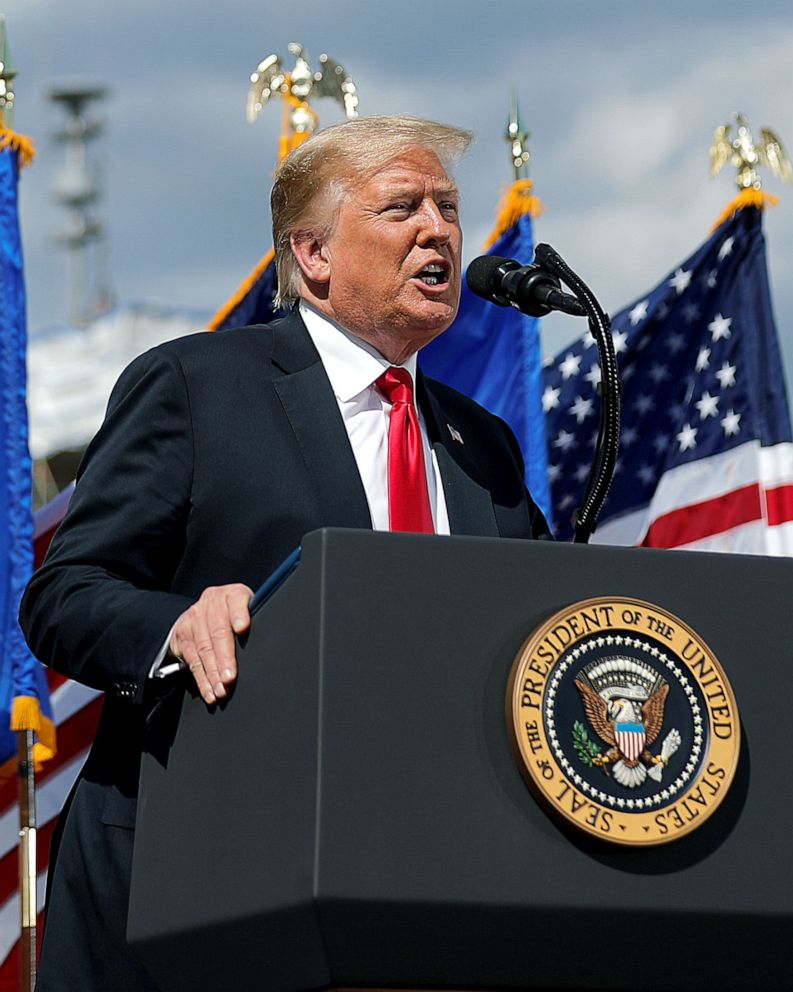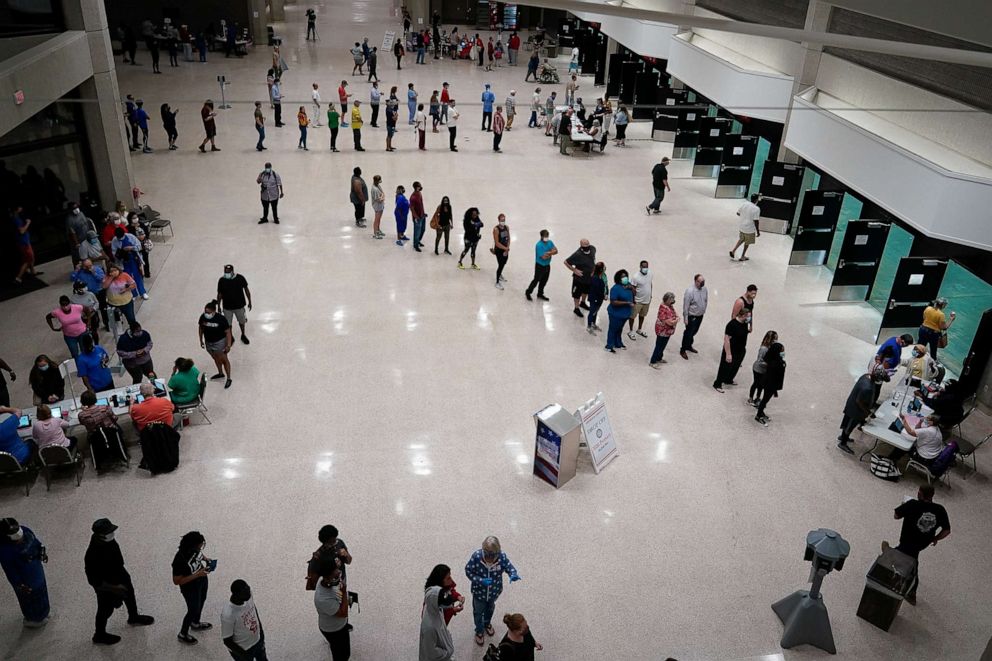The Note: Polls suggest Trump misreads a moment on COVID-19
In a new poll, 56% of Americans say the U.S. moved too quickly to reopen economy
The TAKE with Rick Klein
President Donald Trump didn't have to resume his campaign rallies. He didn't have to promise a packed house. He didn't have to say he ordered testing slowed. He could still wear a mask.
Those choices and more have interrupted Trump's plans for a political revival that might mirror the country's comeback. Now, a president with supreme confidence in his ability to read the public's mood is in danger of finding himself out-of-step with the moment -- in ways that could imperil public health, on top of his reelection chances.
New ABC News/Ipsos polling out Friday morning shows a country growing more concerned about contracting COVID-19 – and less ready to get back to everyday life.

A clear majority of 56% of Americans say the country moved too quickly to reopen the economy. And 89% -- including 79% of Republicans -- say they've worn a mask when going out in public in the last week.
Trump, of course, won't wear a mask. He and others in his party have made such decisions into cultural touchstones in recent weeks, even as some prominent Republicans -- Florida Sen. Marco Rubio and Texas Gov. Greg Abbott among them -- emerged this week to tell people they should be wearing them.
Former Vice President Joe Biden is making a point of having a mask on at his events. He is using that choice and more to argue that the president is "like a child" in his response to the pandemic.
Trump's political fortunes have been altered dramatically by events of the past few months. Trump may want to rewind the clock to February, when Democrats were scattered, the economy was strong and COVID-19 was not yet an American problem.
His issue now, though, is that the country looks more like it did in March or April, only with twists provided by Trump. A week he hoped would demonstrate a return to normalcy has instead shown a president making questionable choices -- both political and personal.
The RUNDOWN with MaryAlice Parks
The Department of Defense and U.S. Army specifically are continuing to grapple slowly with how to handle Confederate symbols in their ranks.
While the president has made clear he does not want those bases named after Confederate generals to be changed, there is still talk of a bipartisan panel to look at the issue and discuss the future of the U.S. military using the names of the very generals who, 150 years ago, fought against the U.S. military. The last few months have prompted a tough conversation about the message, impact and potential harm of continuing to use these controversial names.

As the corporations and the country continue to make changes to address systematic racial inequities, Secretary of the Army Ryan McCarthy on Thursday announced a new move too within the branch intended to combat unconscious racial bias in the promotions process. Specifically, personnel files prepared for promotion boards will no longer include photos of the candidates. However, the box indicating the race of the promotion candidate will remain for now -- though it could also be removed later this year.
Army officials said studies have shown that the removal of the photos, even with that box, provides a more neutral selection process.
Promotion is, of course, just one way to help diversify the military at all ranks, but it's a move that could have a big ripple effect in terms of setting policy and decision-making.
The TIP with Meg Cunningham
With the outcome in the Kentucky Senate Democratic primary still outstanding, all eyes have turned to Colorado's Democratic Senate primary, where, not unlike Kentucky's primary, a progressive -- Andrew Romanoff -- is facing off against a Democratic Senatorial Campaign Committee-backed candidate -- former Gov. John Hickenlooper.

Hickenlooper, plagued by ethics violations and a handful of gaffes, is the subject of ads from Romanoff, Republican Sen. Cory Gardner and the National Republican Senatorial Committee. Romanoff's campaign released an internal poll last week showing him gaining ground on Hickenlooper, though the former governor and 2020 presidential contender was still safely in the lead.
Colorado is a state that has heavily relied on the mail system for its elections -- this time around completely eliminating in-person voting -- so Hickenlooper may be aided by the fact that ballots were already being cast before the ads from his opponents were released. Answers won’t come quick, however. Despite Colorado's experience with mail-in elections, like so many other major Democratic primaries, clerks said the final outcomes are expected to be delayed.
ONE MORE THING
Spiking cases of COVID-19 have shifted sentiments around the pandemic in recent weeks, with the nation growing more concerned about becoming infected, generally more reticent to engage in normal activities than just two weeks ago and believing that the country reopened up too fast, according to a new ABC News/Ipsos poll released Friday. An overwhelming majority of Americans say they've worn a face mask in public in the last week, as the coronavirus pandemic persists and infections reach new highs in more than a dozen states, a new ABC News/Ipsos poll finds.
THE PLAYLIST
ABC News' "Start Here" podcast. Friday morning's episode features a conversation with ABC News Chief National Affairs Correspondent Tom Llamas as Texas pauses reopening plans due to rising coronavirus cases in the state. ABC News' Liz Alesse explains how small businesses have fared as government funding starts to run dry. And, ABC News Senior Washington Reporter Devin Dwyer explains Thursday's Supreme Court ruling on immigration. http://apple.co/2HPocUL
WHAT YOU NEED TO KNOW THIS WEEKEND
Download the ABC News app and select "The Note" as an item of interest to receive the day's sharpest political analysis.
The Note is a daily ABC News feature that highlights the key political moments of the day ahead. Please check back Monday for the latest.




